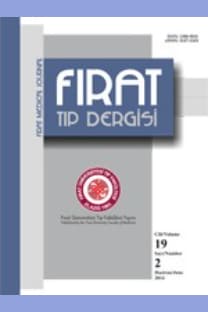Comparison of different quantitative methods and visual evaluation on the Tc-99m-HMPAO brain perfusion SPET
Teknesyum Tc 99m ekzametazim, Karşılaştırmalı çalışma, ROC eğrisi, Tomografi, emisyon bilgisayarlı, tek foton, Konu ile ilgili değerlendirme çalışmaları
Tc-99m-HMPAO beyin perfüzyon SPET'inde farklı ölçüm metodları ve görsel değerlendirmenin karşılaştırılması
Technetium Tc 99m Exametazime, Comparative Study, ROC Curve, Tomography, Emission-Computed, Single-Photon, Evaluation Studies as Topic,
___
- 1) Catafau AM. Brain SPET in clinical practice. What you need to know. Part 1. Perfusion. J Nucl Med 2001; 42: 259-271.
- 2) Hung GU, Tan TS, Kao CH, Wang SJ. Focal cerebral hyperperfusion in phantom limbs: assessed by Tc-99m-HMPAO SPECT. Kaohsiung J Med Sci 2000; 16: 429-431.
- 3) Chiu NT, Chang YC, Lee BF, Huang CC, Wang ST. Differences in Tc-99m-HMPAO brain SPET perfusion imaging between Tourette's syndrome and chronic tic disorder in children. Eur J Nucl Med 2001; 28: 183-190.
- 4) Umemura A, Suzuka T, Yamada K. Quantitative measurement of cerebral blood flow by (99m)Tc-HMPAO SPECT in acute ischemic stroke: usefulness in determining therapeutic options. J Neurol Neurosurg Psychiatry 2000; 69: 472-478.
- 5) Soonawala D, Amin T, Ebmeier KP, et al. Statistical parametric mapping of Tc-99m-HMPAO-SPECT images of the diagnosis of Alzheimer's disease: Normalizing to cerebellar tracer uptake. Neuroimage 2002; 17: 1193-1202.
- 6) Vignola S, Nobili F, Picco P, et al. Brain perfusion SPECT in juvenile neuro-Behcet's disease. J Nucl Med 2001; 42: 1151- 1157.
- 7) Pagani M, Salmaso D, Jonsson C, et al. Regional cerebral blood flow as assessed by principal component analysis and Tc-99m- HMPAO SPET in healthy subjects at rest: normal distribution and effect of age and gender. Eur J Nucl Med 2002; 29: 67-75.
- 8) Claus JJ, van Harskamp F, Breteler MM, et al. Assessment of cerebral perfusion with single-photon emission tomography in normal subjects and in patients with Alzheimer's disease: effects of region of interest selection. Eur J Nucl Med 1994;21:1044- 1051.
- 9) Ramachanran VS, Hirstein W. The perception of phantom limbs. Brain 1998; 121: 1603-1630.
- ISSN: 1300-9818
- Yayın Aralığı: 4
- Başlangıç: 2015
- Yayıncı: Fırat Üniversitesi Tıp Fakültesi
PFAPA sendromu: Bir periyodik ateş tablosu
Burak TURGUT, TAMER DEMİR, Ülkü ÇELİKER
Yusuf YAKUPOĞULLARI, Ayten GÜNDÜZ, Mehmet ÖZCAN, Mürüvvet DOĞUKAN, Adnan SEYREK, Mustafa YILMAZ
Tanı konulmamış miyastenia gravis şüpheli gebede epidural anestezi
Ramazan ÖDEŞ, Ömer Lütfi ERHAN, Rıfat KILIÇ, Muhammed DEMİRCİ
Tüberküloz tanısı ile izlenen hastaların klinik ve laboratuar özellikleri
Abdullah KURT, HATİCE GAMZE POYRAZOĞLU, Mehmet TURGUT, Saadet AKARSU, Çıtak Ayşegül Neşe KURT, Mustafa AYDIN, Nimet KABAKUŞ, Erdal YILMAZ, A. Denizmen AYGÜN
Nezihi BARIŞ, İlke SİPAHİ, E. Murat TUZCU
Antral gastritlerde Helikobakter pilori yoğunluğu ve mast hücre sayısı arasındaki ilişki
Adile Ferda DAĞLI, Gülçin CİHANGİROĞLU, Bengü ÇOBANOĞLU, İbrahim H. ÖZERCAN, İbrahim H. BAHÇECİOĞLU, Reşat ÖZERCAN
Epilepsi hastalarında interiktal EEG ve nöbet prognozu arasındaki ilişkinin araştırılması
Abdülkadir KOÇER, Nurhan İNCE, EREN GÖZKE, Çubuk Derelioğlu Ayşegül, Sultan ÇAĞIRICI
Nephrotic syndrome in a child following a cee sting
Mustafa AYDIN, Nimet KABAKUŞ, Saadet AKARSU, Mustafa DEMİROL
Yılmaz ÖZBAY, Mehmet AKBULUT, EMİR DÖNDER, Adil BAYDAŞ, Gıyasettin BAYDAŞ, M. Ferit GÜRSU
